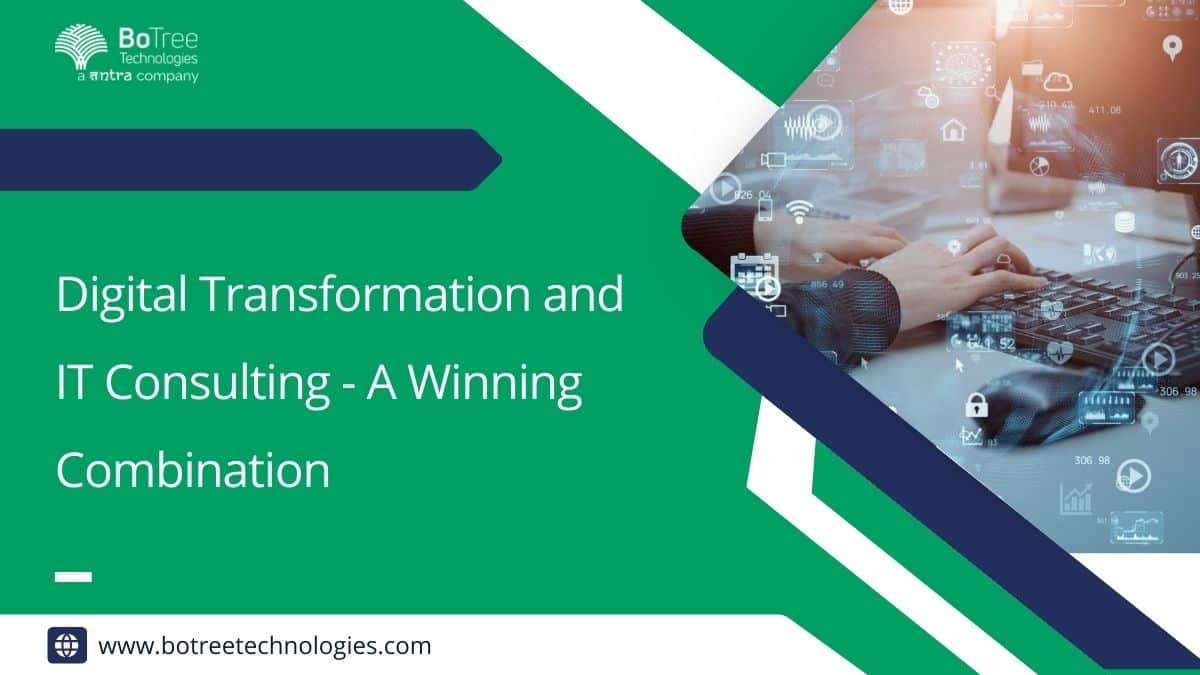
Digital Transformation and IT Consulting – A Winning Combination
Introduction
During the pandemic, remote work became very popular, and digital transformation accelerated. Digital transformation is set up to stay longer. Thus, Clients will expect consultants and consulting companies to emphasize digitalization and use the advantages of tools for digital transformation. With change management consultants, technical specialists from different industries, and digital transformation services experts, the best app developer can link businesses with the knowledge and resources they need to execute a successful transformation project.
To maintain their competitiveness, consultants need to keep abreast of new developments. Here, we go over several significant trends in consulting:
1. Post-pandemic Consulting: Digital Transition for Consultants :
The consultant’s function is evolving and will undergo more changes through 2023. In the past, consultants went to customers’ homes and places of business to meet with them and learn about their requirements. However, onsite consultation is only anticipated to be a crisis preventive measure in the future.
Consultants will still interact electronically with customers while working from remote places throughout the globe. We will embrace tools that make working with stakeholders and obtaining needs less time-consuming by automating and speeding up the process. Client demand for specialized and trained resources will increase. As remote work becomes more commonplace than in-person cooperation, there will also be a growing need for automation.
2. Growing Need for Specialized Knowledge in Certain Fields :
Because they are authorities in a particular field or issue, subject matter experts are particularly suited to offer advice and strategies. Businesses requiring a technological approach to operations and culture are in great demand. The importance of the SME is growing because of the consulting industry’s change in emphasis from high-value, immediate tasks to more broadly strategy development.
Expertise in specialized fields or industries will drive most future demand for strategies after 2023. Those consultants and consulting firms who offer specialized services will be easily distinguished from the competition.
3. Matching the Appropriate Technology to Your Niche :
Combining your specialty with the appropriate technologies may give you a competitive advantage. Consultants must utilize technology to inform strategy rather than vice versa, as modern corporate strategy depends on it. Technology may assist businesses in achieving their objectives and producing quantifiable outcomes when applied appropriately.
To experience the full benefits of digital transformation, consultants must develop a plan, communicate with relevant parties, and thoroughly grasp company requirements. Ensure you have the appropriate digital transformation tools to set your company out from the competition after determining your specialty.
4. ROI for Clients :
Businesses with Sustained Margins can locate excellent experts without working with a single consulting firm. Many more organizations may now recruit highly competent freelance management consultants because of platforms for independent consultants. Instead of paying outrageous fees to a single large consulting company, this enables organizations to choose the top consultants from specialized fields.
5. Consulting Firms are Wanting More Strategy :
With strategy becoming a more critical role, businesses are scrambling to create internal strategy teams. The commoditization of strategy is driving a change in the structure of management consulting. To remain relevant, large consultancies have been compelled to step up their strategy execution, particularly in digital and technology consulting.
Successful consultants and businesses will provide clients with digital transformation strategy solutions supported by robust AI technology and digital goods. AI provides many benefits, including improved forecasting accuracy, reduced human capital requirements, and resource repurposing. As they promote asset-based consulting models and incubate data-driven technological solutions, specific major organizations are well-positioned to gain from being digital disruptors.
Strategy development will heavily rely on automated decision-making, machine learning, predictive analytics, codeless software, and streamlining and automating tedious administrative work to increase output and efficiency.
6. To focus on Core vs Non-Core Activities, Clients will Seek Consulting Advice :
The core/non-core debate is being radically rethought by companies, which will have significant long-term ramifications for consultants and consulting firms. “Core” activities are strategic assignments that increase customer value and boost revenue.
Daily regular chores that do not contribute significantly to the business and are not a profit center are sometimes called “non-core” operations. Technology is mostly to blame for this move to core operations.
Previously, technology was up against the company wall and was typically outsourced to outside parties that could provide a better service for less money. But compared to other factors, technology is now more likely to be a primary activity. Businesses will depend more and more on outside parties to complete essential tasks.
7. Innovation in the Assessment and Needs of Technology Collecting Method :
All too often, consultants will invest too much time and money in a technology review to receive a software solution that does not meet their needs and will not utilize it.
Three criteria must be lowered for your review to be of high quality: difficulty, partiality, and time spent finding the best fit. These factors may be significantly decreased by utilizing the power of cutting-edge technical instruments.
Obtaining the necessary needs is also essential to the success of digital transformation. But this isn’t achievable without knowing the demands of the appropriate stakeholders and having conversations with them.
Selecting the incorrect solution is less likely when the proper stakeholders are included in the collaboration. Compounding benefits exist when stakeholders’ opinions are valued throughout the requirements-collecting process. Consultants can ensure a smooth deployment and strong user acceptance with the correct input and validation.
8. Consultants’ Use of Automation :
To be competitive, consultants must acquire the skills to cope with and adjust to the rapidly changing digital and technological sector.
Today’s successful consultants excel at highly embraced technical implementation, from project start to end, as many firms pursue digital transformation. Today’s best consultants need a full suite of technologies, strategies, and implementation tools to be competitive. Consultants who use automation can do more with less work, and their clients will profit from it.
Why IT Consulting and Digital transformation is a winning combination?
1. Ongoing education
The fact that digital competence is a process that is always changing is its primary attribute. Technology is constantly evolving and doing so more quickly than in the past. Businesses that put in the effort to ensure that staff members are informed about new advancements are likely to see success. Therefore, programs for upskilling, information exchange, and continual learning are characteristics of digital competence.
2. Data administration
Information is what drives digital technology. The first step towards becoming digitally competent is knowing how to express information demands and locate pertinent information in a digital setting. Workers must be able to organize, store, and retrieve data or material after analyzing, comparing, and evaluating its quality. The secret to efficient information management is to follow these procedures.
3. Online Employment
The worldwide pandemic has caused the digital skills required for remote employment to rise in importance. But these behaviors are here to stay, and being able to use remote working tools is now a critical component of digital proficiency. Business agility requires familiarity with virtual meetings, tools for communication, and rapid information exchange, and this is where the role of IT consultants becomes essential.
4. Communication
The fourth element of digital competency, digital communication in general, is nourished by the subject of remote working. Workers must be able to communicate using a range of digital platforms and comprehend the proper modes in each situation. This includes the capacity to exchange data, comprehend credit and reference guidelines, and produce digital materials.
5. Digital Identity
Employees should also know how to maintain their online personas or digital identities. They must know how to use digital communication technologies to safeguard their professional reputation. They should also know how to handle this data using various settings and services.
6. Security and privacy
Security is more important than ever for digital proficiency. Workers must be aware of the threats in the digital sphere and know how to safeguard their devices and data. Team members must, for example, be able to utilize and exchange personal information while taking the necessary precautions. This may be as easy as realizing how crucial it is to read privacy regulations or identify phishing schemes. IT consulting firms can help create a secure environment for data sharing and also spread awareness about data privacy and security.
7. Culture on the internet
Broadly speaking, an organization’s culture consists of the beliefs, traits, and customs that characterize its functioning. An implicit code of conduct that guides people’s online behavior will be present in a thriving digital culture.
8. A digital strategy vision
Culture is a concept that is constantly changing. Companies must have a digital vision to maintain a thriving digital culture. Digitally mature companies know why and what they seek to enhance through digital; without these guiding principles, you’ll forget about the consumer and how to provide value. Employers and workers who are proficient in digital recognize that technology should be used to achieve goals rather than just for its own sake. Hire an IT consulting company like BoTree Technologies to help you design a robust digital transformation strategy.
IT Consultants’ Guide to Digital Transformation
The fast technical and digital change rates are here to stay, and to succeed, consultants must stay current with current developments. Consultants must demonstrate that they are making the most of digitalization as customers want more excellent digital proficiency.
BoTree Technologies is a leading IT Consulting Services company excelling consistently in digital transformation initiatives.
Contact BoTree Technologies today to learn more.




